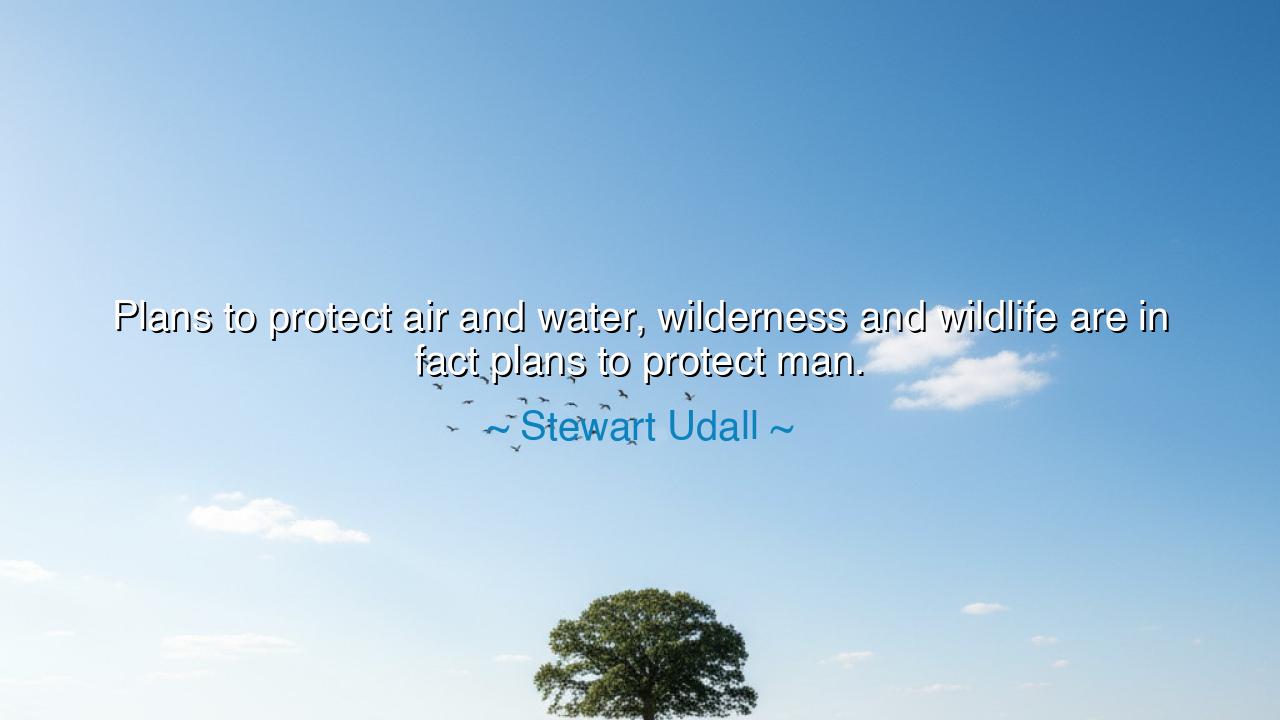
Plans to protect air and water, wilderness and wildlife are in
Plans to protect air and water, wilderness and wildlife are in fact plans to protect man.






In the wise and enduring words of Stewart Udall, a guardian of the American land and a prophet of environmental stewardship, we find a truth as old as the earth itself: “Plans to protect air and water, wilderness and wildlife are in fact plans to protect man.” These words do not merely speak of conservation—they speak of survival, of harmony, of our sacred bond with the living world. They remind us that in shielding the earth, we shield ourselves; in preserving the wild, we preserve the spirit that sustains all life. For man and nature are not separate entities, but two breaths of the same creation, bound together in destiny and in need.
Stewart Udall, who served as U.S. Secretary of the Interior during a time when industry and expansion threatened the American wilderness, spoke these words as both a warning and a call to wisdom. He saw that humanity, in its hunger for progress, was devouring the very foundation of its existence. Rivers were poisoned, forests felled, and skies darkened with the smoke of ambition. But Udall understood what few dared to admit: that every act of destruction against the earth is an act of self-destruction, and every effort to heal it is an act of self-preservation. Thus, he declared that when we make plans to protect air and water, we are not serving abstract ideals—we are protecting the lungs that breathe, the hands that work, and the hearts that live upon this planet.
The meaning of Udall’s words lies in the eternal truth of interdependence. The air we breathe, the water we drink, the food we harvest—all are gifts of the natural world. When we contaminate the river, we poison our own blood; when we scorch the forests, we burn the shelter of generations to come. The wilderness and wildlife, though they may seem distant from our cities and machines, are the silent keepers of balance—the unseen allies who cleanse the air, guard the soil, and regulate the flow of life. To destroy them is to unmake the very web that holds us. Udall’s vision, therefore, is not sentimental—it is scientific, moral, and profoundly human.
Consider the tragedy of the Aral Sea, once one of the largest lakes on earth. Through reckless exploitation, rivers that fed it were diverted, and within decades, the sea shrank to a barren plain of salt and dust. The fishermen who once thrived along its shores were left destitute, their children sickened by windborne toxins, their communities ruined. It was not nature that turned against man, but man who betrayed nature—and paid the price. The story of the Aral Sea is a mirror for us all, showing that the destruction of the environment is not a distant event; it is the slow unraveling of human welfare itself.
And yet, within Udall’s words, there is also hope—a call to remembrance and renewal. He believed that humanity possessed not only the power to destroy, but also the wisdom to restore. When the Clean Air Act and Clean Water Act were passed in the United States, inspired by the movement Udall helped ignite, rivers once choked with filth began to run clear again, and skies once veiled with smoke opened to blue. These were not just victories for nature—they were victories for humankind. The protection of the environment is not a burden to be endured, but a covenant to be honored: a promise to future generations that they will inherit not a wasteland, but a living world.
From the perspective of the ancients, this truth would not be new. The old tribes and early civilizations understood the sacredness of balance. The Egyptians revered the Nile as a divine artery of life; the Native Americans spoke of the Great Spirit dwelling in every tree, stone, and creature. To harm the earth was to offend the divine order; to live in harmony with it was to thrive. Udall’s wisdom is but a modern echo of this ancient voice—a reminder that progress without reverence is ruin, and that man’s dominion is not ownership, but responsibility.
So, O children of the earth, take this teaching to heart: when you act to protect the air, you safeguard the breath of your children. When you strive to preserve the waters, you secure the blood of the planet that sustains you. When you stand for the wilderness and wildlife, you defend not just beauty, but the essence of life itself. Do not separate yourself from the world that bore you—honor it, guard it, and let every choice you make be one that sustains creation, not consumes it.
For in the end, as Stewart Udall reminds us, the fate of nature and the fate of man are one and the same. To protect the earth is to protect ourselves. To wound it is to wound our own souls. Let this be our legacy—that we were not the generation that forgot, but the one that remembered; not the destroyers of Eden, but its stewards, its guardians, its grateful sons and daughters. For only by protecting the world that sustains us do we prove ourselves worthy of living upon it.






AAdministratorAdministrator
Welcome, honored guests. Please leave a comment, we will respond soon